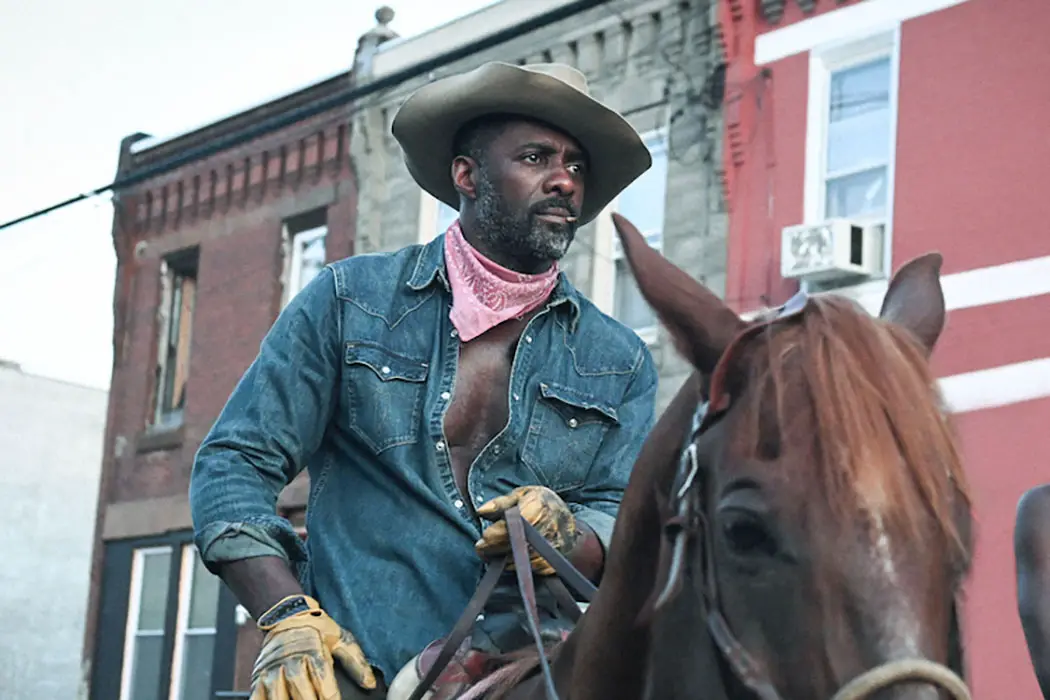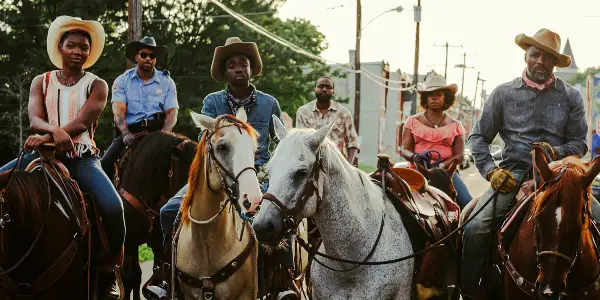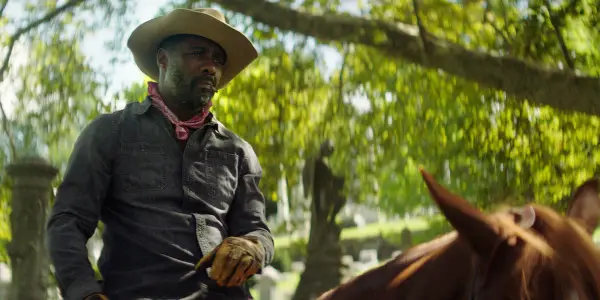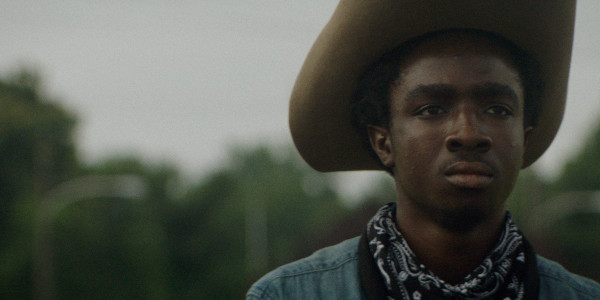Interview With Ricky Staub, Writer-Director Of CONCRETE COWBOY

Luke Parker is an award-winning film critic and columnist based…
One day, from outside his office window in North Philadelphia, Ricky Staub saw a cowboy on horseback, galloping along the concrete as if the boulevards and avenues beneath him were still made of dirt and grass-root. A few questions traced the city equestrian to the Fletcher Street Stables, which, for the past century, have been planted only a few blocks from Staub‘s office. He had no idea.
As if the uncommon sight was a premonition – which wouldn’t be a ridiculous reaction to have – Staub set off to work. He met members of Philly’s horse-rider community, and he dug himself a trench within it. But it wasn’t until he came across Greg Neri‘s novel Ghetto Cowboy that the idea of making a movie came to fruition.
Years of research, production, and festival runs later, Staub‘s Concrete Cowboy will go live on Netflix April 2.
Film Inquiry recently spoke with Staub about his experience making the urban western, including his collaboration with community members, the red tape he and his team had to navigate, and his relationship with star Idris Elba.
This interview has been edited for clarity.
When you first came across the urban horse riders and Greg Neri’s novel, what did you see that “would make a great movie?”
Ricky Staub: Visually, it’s very resting to see a cowboy riding down the streets of North Philly. It’s not a common image. But obviously, this majestic creature in the middle of the neighborhood, from a visual standpoint, is very resting, which then drew me to the book.
But what really sealed the deal for me – in 2011, I started a production company in Philadelphia called Neighborhood, with a mission to hire adults returning home from incarceration. And the first cowboy I met, his name was Eric Miller. I was speaking in court, as I do every year. He had been out of prison for a week and already purchased a horse, which I found very fascinating. So we struck up a conversation and I was able to learn more about Fletcher Street and the community there, the problems they were facing with gentrification making its way up north and their fear of losing their land and stables.

We started talking and our core mission from the beginning was to make a movie to draw attention to what was happening there and preserve the heritage of Black riders, Black cowboys in Philly.
It checked a lot of boxes for me. Obviously, there was the visual interest, but when I realized that there was a real heart to the story and a mission behind it, I was pretty hooked.
I know you spent a lot of time with the community before you began shooting. In those two years, a lot of the riders said that they found respect and trust for you and the project. But what did you find in those two years?
Ricky Staub: I think I found out a lot about the way a community – and a lot of communities in Philly, but particularly the cowboys – can love the beautiful things about each other well beyond the negative things about each other. There’s a lot of ways you can look at a community in an impoverished area, particularly when they’re caring for horses, and make judgments that it’s unsafe or a dangerous area. But I felt nothing but this beautiful community of love there. Not perfect in many ways, but the way I was invited in and allowed to be a part of their story is a testament to the way that they give people the benefit of the doubt.
They taught me a lot about love and caring for each other amidst our struggles just to be human. We’re all broken, but in a lot of ways, that’s what makes this community so beautiful.
Now, this was the second film at TIFF last year that involved entrenchment in an American subculture, the first being Nomadland. And both films employ members of their respective communities as actors. As a filmmaker creating and also watching this worldview, what do those performances add to the experience?
Ricky Staub: To me, they are critical in making the film have a texture and an authenticity that pulls it away from being “Hollywood-y.” Even a lot of my initial conversations with Idris and Caleb were recognizing that I didn’t want this to be like they were playing dress-up. That this wasn’t a Halloween event where they dressed like cowboys.
And I think for both films – being a huge fan of Nomadland and what was achieved there – I saw it happen on our set: the performances of the real community grounded the performances of Idris and Caleb and all the others. They were able to draw from those relationships and those people to make sure that their performances were honest.
And in the same right, these community members have never acted in a film before. So they’re able to glean a lot of techniques and strategies off of the actors who’ve been doing it their whole lives.

But something I loved about Nomadland, and something we wanted to achieve in our film is taking this magical world with this heightened realism but make it feel grounded. To me, there was no better way than to put the actual people in their own story. There’s no way to fake it.
In art, with authenticity comes challenge, especially behind the scenes. Horses in modern cities sound like a logistical issue in and of itself, but what challenges came with shooting horses in cities?
Ricky Staub: Well out the gates, there’s safety. We’re also shooting in the middle of summer, so there’s that. They’re animals. Thankfully, we had really wonderful horse trainers. LTD is the company that brought in our picture horses. But then, we were also using the real horses down at Fletcher Street as background. You know, they’re animals – humans don’t even obey when they’re asked to do something, let alone an animal.
But as long as we were flexible and understanding, a lot of our approach was to capture the world in a documentary-style anyway. It went to those variables in a lot of ways, like, “okay, this is how they’re acting. We need to pivot and just capture what’s possible in that moment.” There had to be a lot of flexibility.
I don’t know what kind of red tape the stables themselves had to deal with, but was there any kind of problems in that regard?
Ricky Staub: Logistically, it was just challenging. Thankfully, we had a really great person on our team who’s a developer, Ryan Spak, that was able to help us navigate a lot of those conversations with the city. You know, every 12 feet you go down, someone else owns those buildings. Much like the film talks about, no one down there actually owns anything, which is part of the problem.
But us coming in as a legitimate outfit, we had to get permits and licensing from people that a lot of the cowboys had never actually met. Thankfully, through land records and working with the city, we were able to get in contact with everyone that owned everything down there, bridge the gap and be able to license everything appropriately. We were even able to get them invested in what we doing and why we were telling the story. So, that was actually pretty cool.
You just mentioned outsiders, people you had to bring in. I know Chloe Zhao has talked about being very careful in making sure it didn’t feel like Hollywood was taking over. Was that a concern for you too?
Ricky Staub: Definitely. I spent several years down there and the Fletcher Street Cowboys were familiar with people filming down there, but we’re talking a couple with a camera. I’m like, “no, this is going to be a village of people who descend on you guys.” Nothing could prepare them.
But something that I’m really proud of from our producers, but also SAG locally, one of the mandates that I put down was that I wasn’t going to commute in any extras. At first, none of the community members are SAG. So, the way it would work normally is that SAG members get first right as extras. But I felt that this is their story, so they’re going to tell it. And SAG worked with us to make sure they could be extras. 11 of our 14 stunt doubles were actual cowboys from the community. Ten of the speaking roles were actual community members.

I was just grateful that while there were hurdles in place, so to speak, everybody was really down for the cause. They knew that yes, while Hollywood was going to descend here and that there were going to be a lot of unfamiliar faces, they were controlling the narrative. I always told everyone who came down there that we’re guests here. And it was really cool to see SAG respecting and honoring the way we wanted to tell the story.
I’m sure I don’t have to tell you how important landing a star is in the development of an independent film. I know Idris Elba was at the top of your wish list to play Harp, so what did the “yes” from him mean to you?
Ricky Staub: It meant the movie was going to get made. [laughs] I joke, but prior to his involvement, what we were going to do was make the film with all the real cowboys. They were going to play all the different roles. I’d just made a short film with all community members, and that was the plan.
But Idris read the script and he wanted to be in it. And so, you know, nobody says no to Idris Elba being in your movie. So we pivoted.
But it also means that we’re here because of his belief. When I first talked to him, I still wanted the DNA of the film to have the real cowboys be a part of it – not just behind the scenes helping me write it, but actually be in the film – which, I imagine, was a huge risk for him as an actor. So I’m just very grateful that he never wavered in his trust of me, and he never, ever doubted that these community members were additive to the film. He fully bought into the belief that they were going to elevate the film, but also his performance.
Just from a talent standpoint, he’s an incredible fit. But from a heart standpoint, I don’t think I ever would have been able to make the film without him.
I actually saw an interview with Idris from The Dark Tower where he was likening himself to Clint Eastwood. And carrying that idea over to this film, even in its title, Concrete Cowboy is an interesting blend of genre. As a writer, what did you find appealing in the combination of the urban setting and Western aesthetics?
Ricky Staub: Putting the script together was fun because one of the initial questions I posed to Erik and Mil – who plays Paris in the film – was “what do you want this film to represent?” And they said that when they were younger, they grew up loving Westerns, but none of the Westerns had Black cowboys. So they wanted to be able to leave a Western that felt like the ones they loved, but had Black cowboys in it.
So, a lot of the fun was reimagining the current day urban setting but with all the tropes and things, we’re familiar with from Westerns. From a script level, I remember when they first read it how enthralled they were that we pulled off weaving those in there.
Considering your work with recently released citizens and the role the stables play in both the film and in North Philly, the idea of establishing structure in life seems to be an overhead subject of yours. Why is structure such an important theme for you?
Ricky Staub: I’ve never used that word, but a lot of it’s like stability. I think something that a lot of us take for granted are the simple things in our life that are stable: a job, a place to call home, a comfortable bed to sleep in at night.
All of the folks who’ve come through my company know that those things aren’t granted. Our society is actually set up to make sure that you can’t get those things. There’s this invisible prison that you’re being welcomed into that will withhold career opportunities.
It’s not just about jobs or nice bedrooms, it’s about the life that those things provide. You can have a family inside the walls of those homes; you can have community inside the walls of those jobs that you hold. It’s the same angst that I could feel from Erik and Mil knowing that this place they called home wasn’t theirs.
And so, for me, the gifts I feel I’ve been given is this thirst for justice, to correct those things here and now for people. And to not waste the moments on just making a movie, or making pretty commercials. Like, how can the actual process of what we’re doing be transformative? Because we spend most of our time at work building things. And it’s just a little bit of a tweak, and all of a sudden, people’s lives are transformed.
I recognized that pretty quickly with Erik. Unfortunately, we lost him a week before prep. He was murdered. It’s still a testament, though. The way the community rallied to make this vision for him and the kids he left behind. His sister told me once that he said this film would be the greatest thing he ever did with his life.
People make movies all the time. They come and go, just like this one will. But I’m thankful that the process in which it was made will last forever.
Film Inquiry thanks Ricky Staub for the time to speak with us!
Concrete Cowboy will be available to stream on Netflix April 2.
Does content like this matter to you?
Become a Member and support film journalism. Unlock access to all of Film Inquiry`s great articles. Join a community of like-minded readers who are passionate about cinema - get access to our private members Network, give back to independent filmmakers, and more.
Luke Parker is an award-winning film critic and columnist based in the Baltimore-Washington metropolitan area. As an entertainment journalist, he has interviewed several members of the film industry and participated in some of its most prestigious events as a member of the press. Currently, he is working to obtain his bachelor’s degree in Mass Communication at Towson University.













